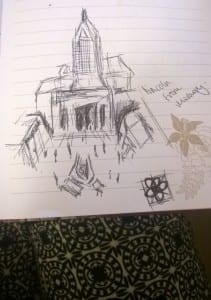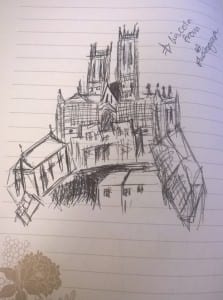As I was absent last week my group filled me in on what tasks they had been doing. They had a group meeting with Conan were they discussed our ideas. He recommended not using costumes, as it may not work as well as we first anticipated and therefore we will have to come up with different ideas. This is because we only have the costumes in the props cupboard and they may not be realistic enough for the audience to believe we are in 1915. We also have to think about how we are taking the audience on the journey as we are not able to actually take the audience back to 1915 therefore we have to think about how we will be able to make the performance believable. This includes what tense we want to write the monologues in and what sounds we want the audience to hear.
This week we wrote the monologues for our three characters. We wrote them in present tense from the characters perspective. They are not as long as I expected them to be, however with layering sounds on them and adding them into the final piece they may work. If not we will be able to record more material and add it in at a later date.
With Amy Beechey’s monologue we are going to include a letter from her eldest son, Bernard. He was the first to pass away at war and we want to focus on how she felt about this. We want to include the final letter he sent her as we feel this will be a powerful piece for the audience to hear. With this in mind, on Tuesday we are going to go to the Lincolnshire Archive to find the letter as they have over 400 of the letters from the Beechey boys.
In Florence Bonnet’s monologue we have spoken about daisy chains because we want the audience to be making a daisy chain when they listen to her speaking. We are doing this because she was only 15 and she was making tracks for tanks that were going to war, when instead she should be living her childhood, having fun and playing games with her friends. She should have been making daisy chains not tracks for tanks. We are hoping the juxtaposition of the audience making the daisy chain whilst listening to Florence talking about tanks will show them that not only men suffered in the war, it was everyone including young women.
With the teacher’s monologue we have decided to talk about her leaving the job as the money is not good enough. With this piece we have already spoken about layering different sounds on it, for example the sound of a school bell and a playground of noisy children to set the scene.
Chloe Downie

